Raccoons are widespread across the US and can be nuisance pests. These highly intelligent mammals can easily be recognized because of their “bandit” mask.
So how do you know if a raccoon has babies? Female raccoons that have babies prefer being alone and hiding in dark places to avoid humans. Although you can hardly see them in your attic, you can hear their babies crying for milk, especially at night. Raccoons are also likely to have babies during their breeding season.
Also called kits, baby raccoons look friendly and huggable, but it does not necessarily mean you can touch them. Aside from the fact that mother raccoons will not allow you to go near them, they pose health risks to humans.
To help you learn more about raccoons and their babies, read this article from start to end.
What Does a Baby Raccoon Look Like?
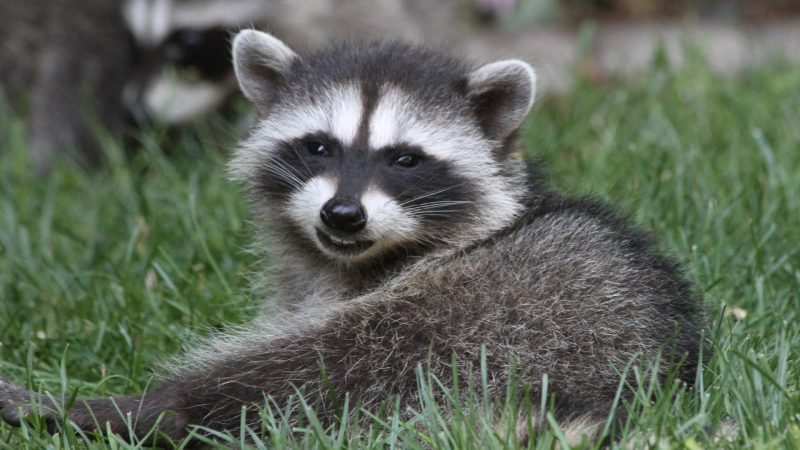
Once baby raccoons are born, they have a faint mask and very light fur and typically weigh 3-5 ounces. They are about 4-6 inches long, and their tail is around 2-2 ¼ inches long.
Their heads seem to be bigger than their bodies. Their eyes and ears are still closed, and their mother will breastfeed them regularly.
How Can I Tell How Old a Baby Raccoon Is?
You can estimate the age of baby raccoons based on their appearance and behaviors. Newborn kits have only very light fur and have their eyes and ears closed until they are about two to three weeks old.
In their first week, baby raccoons may start to eat 6 times a day and may weigh around 150 grams.
Once their eyes and ears open, baby raccoons will not still recognize or respond to sight and sound, but they can already climb. Two-week-old kits may also weigh 250 grams and will start to create louder sounds.
At 4-6 weeks of age, their guard hairs (longer hairs) will start to appear, and they will try to move and walk.
At 6-8 weeks old, their baby teeth will already show up. At this time, baby raccoons will also start to play with each other and get curious about their surroundings.
The weaning process will also start until they can already eat solid foods. Kits are now more active and will hide in small, dark places once startled.
Are Baby Raccoons Friendly?
Baby raccoons are not friendly at all. Despite being cute and cuddly, they still bite and scratch people because raccoons feel that humans are their predators.
Although some states allow having raccoons as pets, raccoons are wild animals. These masked mammals are fairly unpredictable and can be dangerous.
So, if you find a healthy baby raccoon alone in the wild, you should not bring it home to be your pet. Some baby raccoons are playful to their caretakers, but not always.
If not properly domesticated, a six-month-old raccoon can become aggressive and will bite you, especially if you try to touch or carry them.
Do Baby Raccoons Drink Water?
Baby raccoons don’t drink water. Instead, they suck milk from their mothers. If you found an orphaned baby raccoon, don’t give food or water to the animal.
They are still too young to digest food, and water can get into their lungs, causing them to die. If rescue is necessary, call your local animal rescue office at once.
How Many Babies Do Raccoons Have?
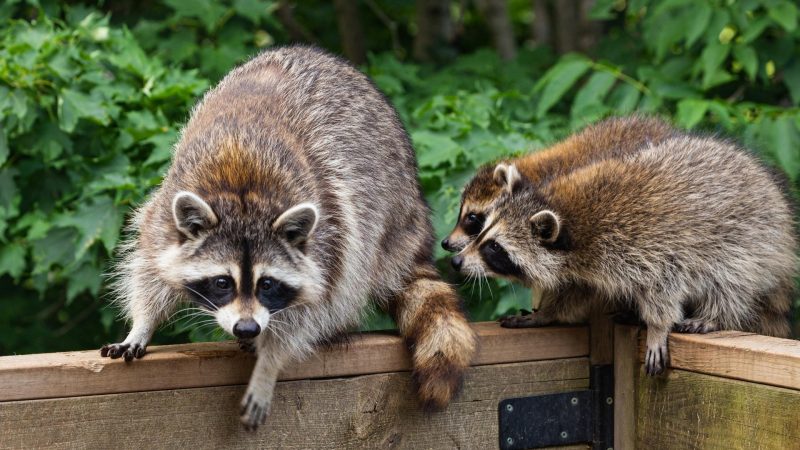
Mother raccoons can have between two and five babies per litter, but sometimes, they can have 8 babies in a single birth. They usually have only one litter a year but may also give birth twice a year, although this is very rare.
Just like human babies or other baby animals, baby raccoons rely completely on their mothers.
Why Do Baby Raccoons Cry?
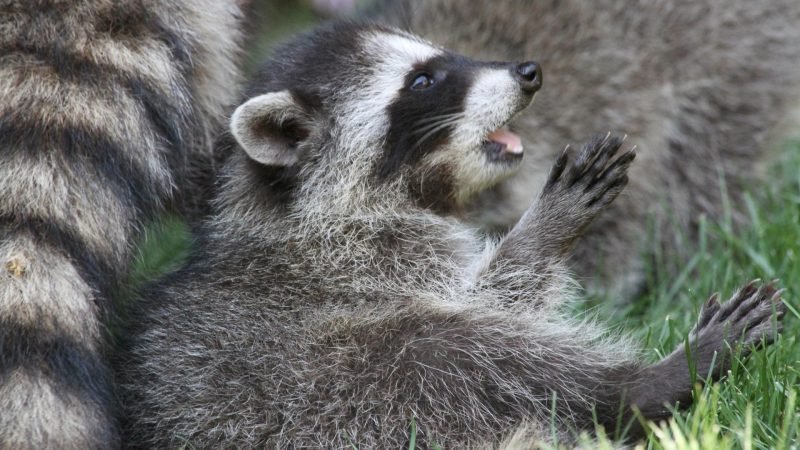
Just like other babies, baby raccoons cry because they are hungry and their mother is not available to nurse them. They can cry for several hours, even at night, especially when they feel cold. If the crying is non-stop for 24 hours, there’s a huge chance that something wrong happened to their mother.
Do Baby Raccoons Sleep a Lot?
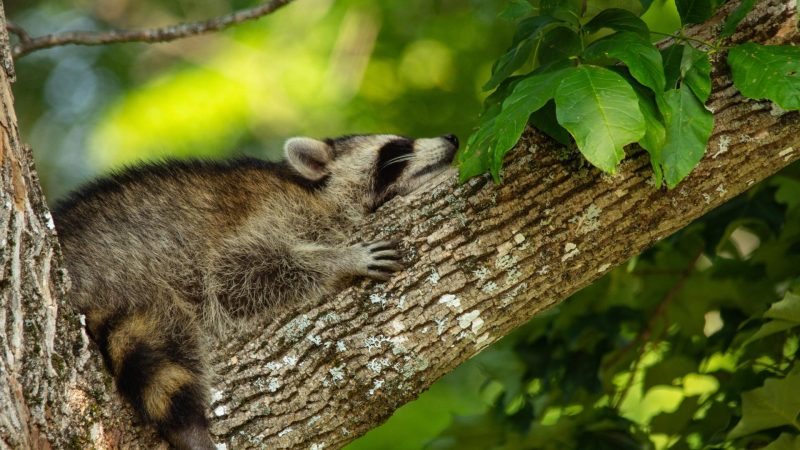
Baby raccoons sleep a lot, but the number of hours will reduce as they grow older. In the first three weeks of life, they sleep longer than they are awake.
But in their fourth week, these baby raccoons will be awake for about one hour every six hours. At 8-10 weeks of age, young raccoons spend less time sleeping.
How Do You Tell if a Raccoon Is Pregnant?
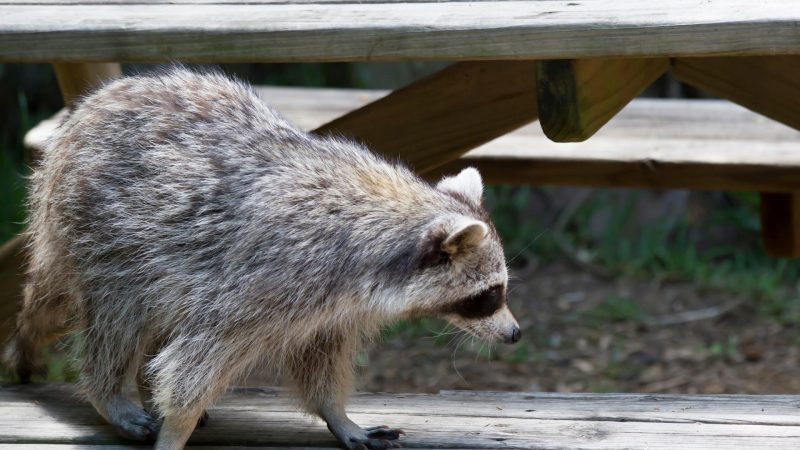
Raccoons tend to hide from humans, so you can hardly tell if a raccoon is pregnant or not, even if you see the animal. But if you have a raccoon in your attic or chimney and it is making some scratching noises, it is likely to be pregnant making a nest. Also, female raccoons are a bit smaller than male ones.
What Time of Year Do Raccoons Get Pregnant?
Male and female raccoons don’t pair up unless during the mating season, which is usually from January to June. Nevertheless, the peak of their mating season is between March and April.
Most female raccoons start to get pregnant once they are 12 months old. The gestation period is around 65 days or more than 2 months.
What Month Do Raccoons Have Babies?
Baby raccoons are usually born in the early spring between March and April. Nevertheless, some of them may have babies in May.
In some cases, especially when all the babies in the first litter did not survive, females may still give birth to a second litter sometime in June.
Related: What Time of the Year Are Raccoon Babies Born? | Information and Facts
Can Baby Raccoons Survive Without Their Mother?
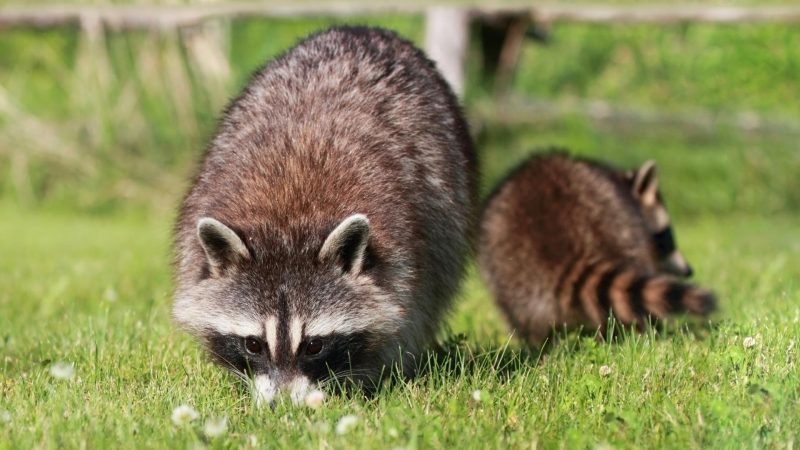
Baby raccoons cannot survive without their mother. At their very tender age, they are very fragile and will only depend on their mother. If they are left alone in their tree nest, they might fall and get injured or die.
If baby raccoons are born in your attic, and you drive away from their mother, they will soon die of starvation.
Do Mother Raccoons Leave Their Babies During the Day?
Mother raccoons leave their babies in their nests during the day to find food. Sometimes, mothers are gone for several hours but would still come back unless they are dead.
This is why it is very common for you to see some baby raccoons alone in a nest. You should not get those kits, especially if they are healthy.
Can Baby Raccoons Find Their Way Back Home?
Baby raccoons cannot find their way back home. First of all, baby raccoons can still hardly walk and cannot travel far. This means that they are very unlikely to leave home without their mother.
Kits stay in the den until they are about 10 weeks old and will stay with their mother until they are about 12-14 months old.
Nevertheless, if a baby raccoon accidentally falls from a tree but is not injured, it is very likely to climb back to its nest as much as it can. Similarly, mother raccoons still go back to their home or territory even if they are about a mile away. This is also why you should not get baby raccoons unless they need help.
Do Raccoon Siblings Stay Together?
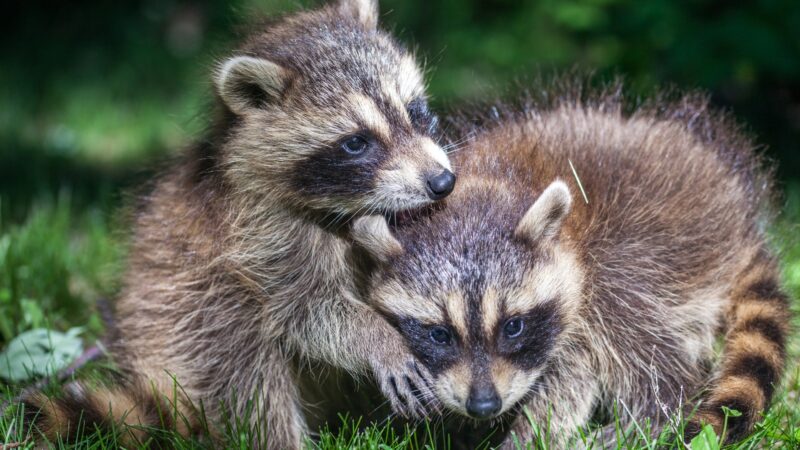
Raccoon siblings stay together but only until they are about 1 year old and are fully self-sufficient. In general, raccoons are solitary and highly independent animals and will leave their family to live on their own. This is also why rescued raccoons should be brought back to the wild, which is their natural habitat.
Can a Baby Raccoon Have Rabies?
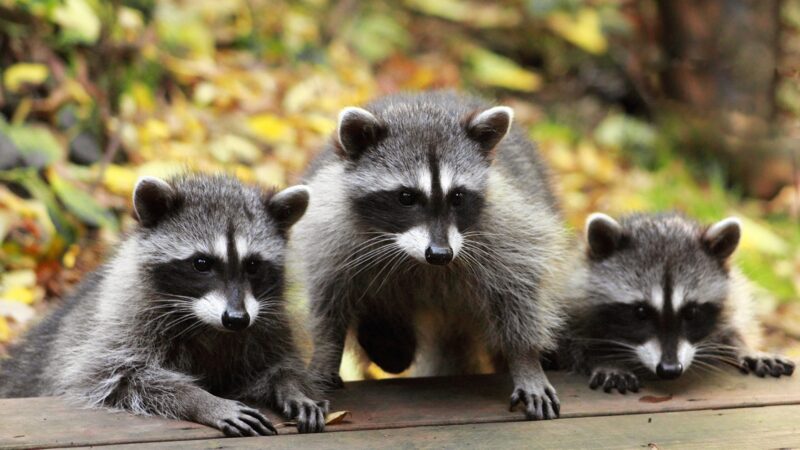
Baby raccoons can have rabies, especially if their mother is also a rabies carrier. Raccoons, along with foxes and skunks, are primary carriers of this viral disease, which is why they are also sometimes referred to as ‘rabies vector species.’ Unfortunately, not all raccoons with rabies will show their symptoms.
Rabies can be transmitted to humans through saliva and direct contact, including being bitten by an infected animal. Therefore, active and healthy-looking baby raccoons can have rabies and you will not notice it.
The only way to prove if a raccoon has rabies is to study its brain tissue and it can only be done to the dead ones.
Related: Raccoon Feces (Toxicity, Dangers, and Diseases) | Control and Prevention
How Do You Know if You Have Babies in Your Attic?
The following are the most typical signs that you have baby raccoons in your attic:
- In particular during the first several weeks, the mother and the kits will be highly loud. The sound is unique to baby raccoons.
- As she takes care of her young, a mother raccoon will be quite active and come and leave multiple times each day in your attic. If the animal is a mother who has just given birth, you can also notice swollen nipples on it.
- When you hear loud scratching and thudding noises as well as lots of activity in general.
What Do I Do if a Raccoon Family Is in My Attic?
If you find a raccoon in your attic, it may also have babies. Raccoons are generally nocturnal animals, which means that they are most active at night. Therefore, you may hear baby raccoons crying at night. If you have a raccoon family in your attic, here are some things you should do and what you should not:
- Don’t drive the mother raccoon away without her babies. Baby raccoons will not survive without her. Instead, wait until the babies are old enough to come with their mother.
- Don’t poison or kill the raccoons. Aside from being illegal in most states, their dead bodies will attract flies and may cause the spreading of diseases.
- Don’t trap and relocate raccoons because it can cause more trouble for them. This is usually done only by professionals.
- If the kits are old enough, you can use loud sounds, bright lights, or unpleasant smells such as cider vinegar to drive them out of your house.
- Don’t approach raccoons or go closer to them since they might attack you if they are cornered.
- Close all possible exit paths except for one so that other raccoons cannot enter your house.
- If you are sure that all the raccoons are gone, prevent them from coming back by not leaving pet foods outdoors, cutting tree branches near your roof, and covering all possible entrance paths.
- If you’re having a hard time driving raccoons away, hire a raccoon removal professional.
Related: Natural Raccoon Repellents That Work | Control Guide
List of Sources
Saunders, D. A. (1988). Raccoon (Procyon lotor Linaeus). State University of New York, College of Environmental Science and Forestry.
Raccoons (Procyon lotor). Washington Department of Fish and Wildlife.
Pierce, R. A. (2001). Managing Raccoon Problems in Missouri. University of Missouri Extension.
- How to Get Rid of Copperheads | Practical Guide - August 27, 2023
- How to Get Rid of Corn Snakes | What Makes Them Aggressive? - August 27, 2023
- How to Get Rid of Alligators | Safety Measures and Removal Methods - July 16, 2023
